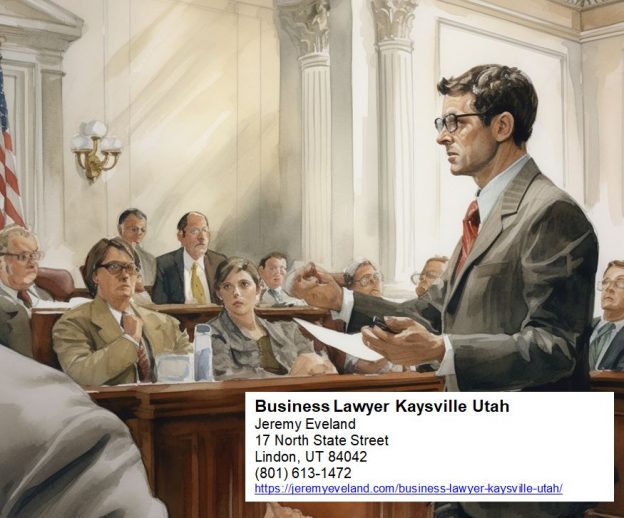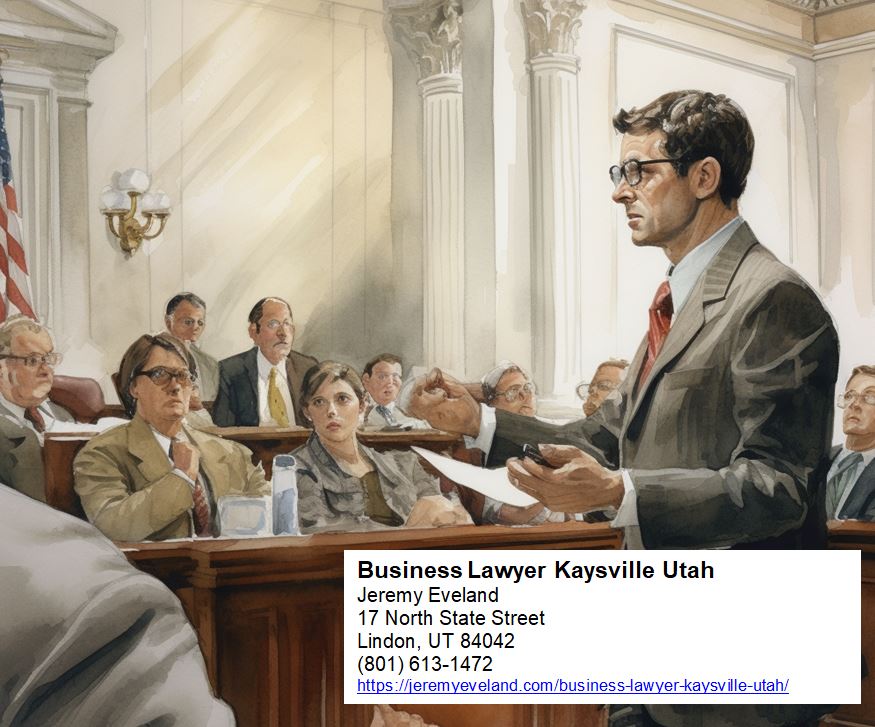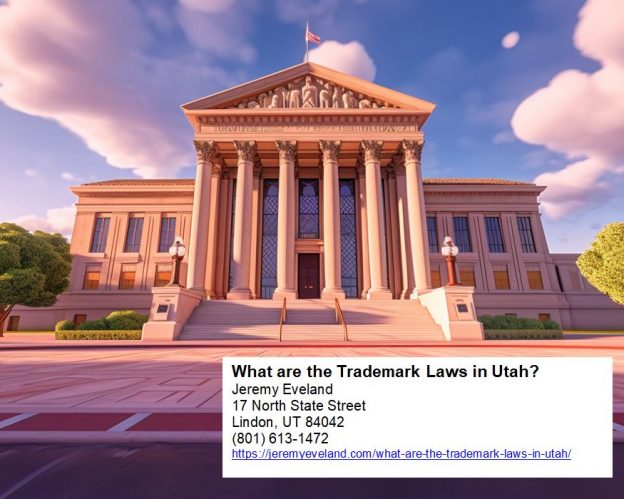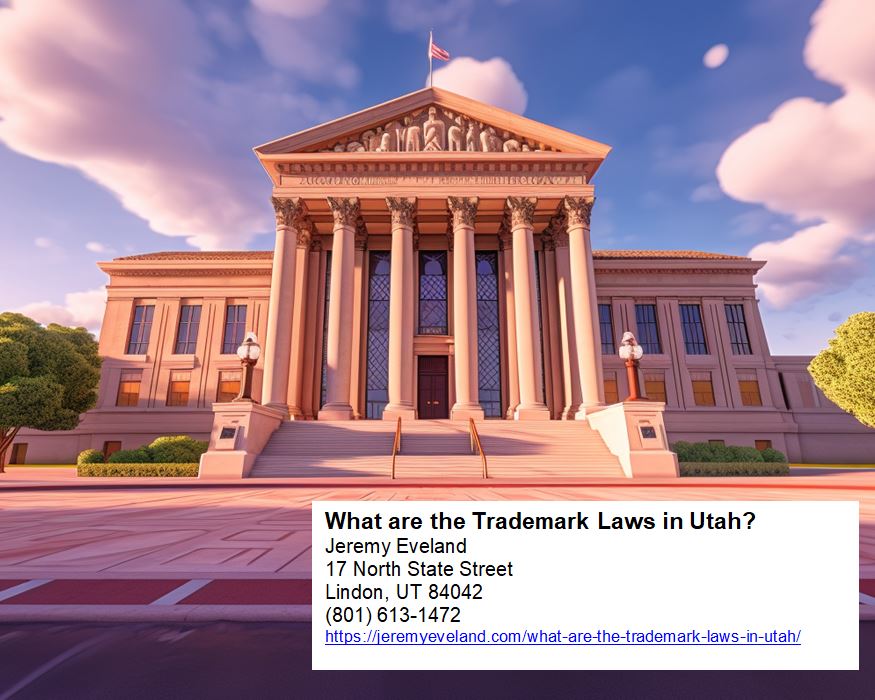Introduction
Starting a business in Kaysville Utah can be exciting, but it also comes with its challenges. As a business owner, one of the essential things you need to do is to ensure that your business is operating within the confines of the law. Business law can be complex and overwhelming, and that’s where a business lawyer comes in.
Definition of Business Lawyer
A business lawyer is an attorney who specializes in legal matters related to businesses. They provide legal advice and guidance on various aspects of starting and running a company. A business lawyer may assist with formation and registration of businesses, contract drafting and review, employment law matters, intellectual property protection, mergers, acquisitions, or any other legal issues related to a company’s operations.
Importance of Business Lawyers in Kaysville Utah
Kaysville Utah has several laws governing businesses that entrepreneurs must comply with when starting a company. Business lawyers are crucial in helping new businesses navigate these laws.
They ensure that companies comply with all local regulations and avoid any potential legal issues. Additionally, as companies grow and become more complex over time, they may face numerous challenges such as disputes involving customers or suppliers or disputes between partners.
In such cases, having a skilled business lawyer can help companies navigate through such conflicts while ensuring their interests are protected. Furthermore, by hiring an experienced business lawyer in Kaysville Utah early on in the process of starting a company helps prevent costly mistakes down the road that could otherwise have been avoided by seeking proper legal advice from the outset.
: The services provided by reputable Business Lawyers are critical for any new or established entrepreneur who wants to operate within the boundaries of their respective industries’ rules and regulations while avoiding costly legal troubles along the way. In this article we will discuss how hiring qualified lawyers in Kaysville Utah can help entrepreneurs and established businesses achieve their goals with minimal legal headaches.
Overview of Kaysville Utah Business Law
Kaysville, Utah is a growing city that has become home to many successful businesses. Like any other city, there are specific laws and regulations that businesses must follow to operate legally.
Kaysville’s business law is aimed at protecting the interests of both business owners and consumers. The legal structure in Kaysville Utah for businesses is similar to that of other states.
The structure includes sole proprietorships, partnerships, limited liability companies (LLCs), and corporations. However, certain types of businesses may be required to register with the state before they can legally operate within Kaysville’s borders.
Types of Businesses in Kaysville Utah
There are several types of businesses in Kaysville Utah, ranging from small mom-and-pop shops to large corporations. These include retail stores, restaurants, law firms, accounting firms, manufacturing companies and more.
One unique aspect about Kaysville’s economy is that many small businesses are family-owned and operated. These family-owned enterprises provide valuable services to their community while also generating income for themselves and their families.
Laws Governing Businesses in Kaysville Utah
Kaysville’s business laws cover a wide range of topics such as zoning regulations, licensing requirements for specific industries such as contractors or childcare facilities. Other areas covered include sales tax collection rules and regulations governing employment practices like payment schedules or anti-discrimination policies. Business owners must also comply with federal laws such as the Americans with Disabilities Act (ADA) which requires equal access for people with disabilities within public spaces including those operated by private entities.
Understanding the legal framework governing business operations is crucial whether you’re starting a new business or already have an established one in Kaysville Utah. Being informed about these regulations can help ensure your business operates legally while minimizing risks associated with noncompliance with state and federal laws.
Services Offered by Business Lawyers in Kaysville Utah
Formation and Registration of Businesses
One of the primary services offered by business lawyers in Kaysville Utah is assistance with the formation and registration of businesses. This includes selecting the appropriate type of entity, such as a corporation or limited liability company, and helping to prepare and file the necessary paperwork with the state. Additionally, business lawyers can advise on issues such as choosing a business name, obtaining any required licenses or permits, and creating an operating agreement.
A competent business lawyer will also provide guidance on compliance with state and federal regulations governing businesses. They will ensure that all documents are properly filed with relevant government agencies, including articles of incorporation or organization, bylaws, corporate resolutions, tax identification numbers (TINs), etc.
Contract Drafting and Review
Another key service provided by business lawyers is contract drafting and review. A business lawyer can draft a variety of contracts including employment contracts for key personnel as well as for customers or vendors. A well-written contract can prevent misunderstandings between parties or provide clarity in case of disputes.
Business lawyers can also review existing contracts to ensure that they are legally binding and enforceable. In this capacity, they will identify any potential pitfalls to protect your interests before you sign a contract.
Employment Law Matters
Businesses face numerous legal challenges related to their employees. Business lawyers assist clients with understanding employment law matters such as employee classification (i.e., independent contractor vs employee), wage-hour laws (including overtime pay rules), discrimination claims (including age discrimination), sexual harassment complaints which have become more prevalent in recent years both nationally and locally.
They help clients comply with labor laws relating to employee benefits like workers compensation insurance coverage requirements which vary depending on location; minimum wage limits; payment systems for overtime work hours worked per week or month, etc. Business lawyers represent clients when employee lawsuits arise. They can also help develop policies and procedures for the workplace that ensure compliance with employment laws and regulations.
Intellectual Property Protection
Business lawyers provide counsel on intellectual property matters, including patents, trademarks, copyrights, and trade secrets. They can assist with intellectual property filings with the appropriate government agencies to protect a company’s valuable assets. Additionally, business lawyers can analyze contracts and agreements to ensure that the client’s IP rights are protected in any business transaction or partnership agreement.
Mergers and Acquisitions
Another important service provided by business lawyers in Kaysville Utah is M&A (mergers and acquisitions) advice. A business lawyer can assist clients through every stage of an M&A deal which includes negotiating terms of the agreement from start to finish.
They review legal documents such as purchase agreements or due diligence reports during this process which helps identify any potential legal hurdles before closing a deal.A competent lawyer will provide guidance on issues like tax implications for both parties involved in a merger or acquisition. Overall, Business Lawyers offer various essential services for companies big or small to run their businesses smoothly while remaining compliant with the law.
Qualities to Look for When Hiring a Business Lawyer in Kaysville Utah
Experience and Expertise
When looking for a business lawyer in Kaysville Utah, one of the most important qualities to consider is their experience and expertise. You want to ensure that the lawyer you hire has experience in dealing with businesses similar to yours. This means they should have relevant knowledge and understanding of your industry, the legal issues that may arise, and how to best navigate those issues.
To gauge the lawyer’s expertise, you should also review their credentials such as their educational background, any relevant certifications or training, and reviews from previous clients. A business lawyer with years of experience handling complex legal matters can provide valuable insights into your business’s legal position.
Communication Skills
Another essential quality to look for when hiring a business lawyer is their communication skills. The attorney must be an excellent listener who understands your concerns and goals for the business. They should also be able to explain complex legal matters in simple terms that are easily understandable by non-lawyers.
Effective communication helps build a strong relationship between you and your attorney. It ensures transparency throughout the entire process so that there are no surprises down the road.
Availability and Accessibility
A good business lawyer should be available when you need them – whether it’s during regular business hours or outside them. Your attorney must prioritize prompt communication with clients so that they can respond immediately if an urgent matter arises or if you have questions about something.
Accessibility is another vital factor when considering potential lawyers. You’ll want someone who can quickly answer emails or phone calls, schedule meetings at times convenient for both parties, and provide regular updates on case developments.
Cost-Effective Services
While cost is not necessarily an indicator of quality service per se – it is still a critical consideration when hiring a business lawyer in Kaysville Utah. You want to ensure that you are getting the best value for your money, and the quality of service you receive matches the cost. Some lawyers may charge higher fees because they have more experience or success in handling complex legal matters.
However, it’s essential to ensure that any attorney you hire provides reasonable rates and offers transparent billing practices. You don’t want any surprises when it comes to billing time.
Hiring a business lawyer in Kaysville Utah requires careful consideration of their experience and expertise, communication skills, accessibility, and cost-effective services. By taking the time to find a qualified business lawyer who can meet these criteria, you can feel confident that your business will be protected and legally sound moving forward.
Frequently Asked Questions about Business Lawyers in Kaysville Utah
What is the role of a business lawyer?
A business lawyer plays a critical role in helping businesses navigate complex legal matters. They provide legal advice, guidance, and representation to businesses of all sizes.
Their primary role is to protect the legal interests of their clients by ensuring compliance with state and federal laws, resolving disputes with other parties, and mitigating potential risks. Business lawyers help with a wide range of issues that arise during the life cycle of a business.
Some common tasks include negotiating contracts, drafting agreements, advising on employment law matters, protecting intellectual property, and assisting with mergers and acquisitions. They work closely with business owners to identify potential legal issues before they become major problems.
How much does it cost to hire a business lawyer?
The cost to hire a business lawyer can vary depending on various factors such as their experience level, geographical location, and the complexity of your legal matter. Some lawyers charge an hourly rate while others may charge a flat fee or contingency fee. Hourly rates for business lawyers in Kaysville Utah typically range from $200-500 per hour.
Some lawyers may also require a retainer fee upfront before beginning work on your case. It’s important to discuss fees upfront with any potential attorney so that you have clear expectations about what services they will provide and what costs you can expect.
How can I find the best business lawyer for my needs?
Finding the right attorney for your needs can be challenging but there are several steps you can take to help ensure you find someone who is qualified and experienced in handling your specific type of legal matter. Firstly, consider the attorney’s experience level – you want someone who has experience handling similar cases or helping clients in similar industries. Ask friends or colleagues for referrals or check online reviews to get an idea of their reputation.
Secondly, look for someone who has strong communication skills and is responsive to your inquiries. A good attorney should be able to explain complex legal concepts in a way that is easy for you to understand.
Consider the attorney’s availability and accessibility – you want someone who can provide prompt service and is willing to work within your schedule. Transparency and trust are crucial when it comes to working with a business lawyer, so take the time to find someone who you feel comfortable working with.
Conclusion
Hiring a qualified business lawyer in Kaysville Utah is crucial to the success and protection of your business. From formation and registration to contract drafting and review, employment law matters, intellectual property protection, and mergers and acquisitions, the right business lawyer can provide invaluable legal guidance and representation.
In this article, we have discussed the definition of a business lawyer as well as the importance of hiring one in Kaysville Utah. We have also covered an overview of Kaysville Utah business law, services offered by business lawyers in Kaysville Utah, qualities to look for when hiring a business lawyer in Kaysville Utah, and frequently asked questions about business lawyers in Kaysville Utah.
It is important to keep in mind that not every attorney practices business law or has experience with the specific needs of your industry or type of company. Therefore it’s essential that you take some time to find a qualified attorney who has experience working with businesses similar to yours.
Overall, having a trustworthy legal advisor on your team can make all the difference when it comes to navigating complex legal issues related to your business. By doing so you’ll be able to mitigate risks while ensuring continued growth and success for your company.
Areas We Serve
We serve individuals and businesses in the following locations:
Salt Lake City Utah
West Valley City Utah
Provo Utah
West Jordan Utah
Orem Utah
Sandy Utah
Ogden Utah
St. George Utah
Layton Utah
South Jordan Utah
Lehi Utah
Millcreek Utah
Taylorsville Utah
Logan Utah
Murray Utah
Draper Utah
Bountiful Utah
Riverton Utah
Herriman Utah
Spanish Fork Utah
Roy Utah
Pleasant Grove Utah
Kearns Utah
Tooele Utah
Cottonwood Heights Utah
Midvale Utah
Springville Utah
Eagle Mountain Utah
Cedar City Utah
Kaysville Utah
Clearfield Utah
Holladay Utah
American Fork Utah
Syracuse Utah
Saratoga Springs Utah
Magna Utah
Washington Utah
South Salt Lake Utah
Farmington Utah
Clinton Utah
North Salt Lake Utah
Payson Utah
North Ogden Utah
Brigham City Utah
Highland Utah
Centerville Utah
Hurricane Utah
South Ogden Utah
Heber Utah
West Haven Utah
Bluffdale Utah
Santaquin Utah
Smithfield Utah
Woods Cross Utah
Grantsville Utah
Lindon Utah
North Logan Utah
West Point Utah
Vernal Utah
Alpine Utah
Cedar Hills Utah
Pleasant View Utah
Mapleton Utah
Stansbury Par Utah
Washington Terrace Utah
Riverdale Utah
Hooper Utah
Tremonton Utah
Ivins Utah
Park City Utah
Price Utah
Hyrum Utah
Summit Park Utah
Salem Utah
Richfield Utah
Santa Clara Utah
Providence Utah
South Weber Utah
Vineyard Utah
Ephraim Utah
Roosevelt Utah
Farr West Utah
Plain City Utah
Nibley Utah
Enoch Utah
Harrisville Utah
Snyderville Utah
Fruit Heights Utah
Nephi Utah
White City Utah
West Bountiful Utah
Sunset Utah
Moab Utah
Midway Utah
Perry Utah
Kanab Utah
Hyde Park Utah
Silver Summit Utah
La Verkin Utah
Morgan Utah
Business Lawyer Kaysville Utah Consultation
When you need help from a Business Lawyer in Kaysville Utah, call Jeremy D. Eveland, MBA, JD (801) 613-1472 for a consultation.
Jeremy Eveland
17 North State Street
Lindon UT 84042
(801) 613-1472
Related Posts
Estate Planning is Crucial for People of All Income Levels
Navigating Legal Challenges in Business Succession Planning
Business Lawyer Bountiful Utah
How To Structure A Merger Or Acquisition In Utah
How To Hire Employees Legally in Utah
10 Tips for Negotiating Lease Agreements
Business Lawyer Spanish Fork Utah
How To Start A Non-Profit In Utah
What are the Trademark Laws in Utah
Business Lawyer Pleasant Grove Utah
How to Calculate Overtime Pay in Utah
Business Lawyer Cottonwood Heights Utah
Understanding Utah’s Consumer Protection Laws
Comprehensive Guide To Hiring A Business Lawyer
Business Lawyer Springville Utah
Mergers and Acquisitions from a Legal Perspective
Business Lawyer Eagle Mountain Utah
Understanding Anti-Trust Laws in Utah
Business Lawyer Cedar City Utah
Understanding LLC Laws in Utah
Business Lawyer Kaysville Utah
[geocentric_weather id=”e8067fba-41a1-4768-9b77-524317d658da”]
[geocentric_about id=”e8067fba-41a1-4768-9b77-524317d658da”]
[geocentric_neighborhoods id=”e8067fba-41a1-4768-9b77-524317d658da”]
[geocentric_thingstodo id=”e8067fba-41a1-4768-9b77-524317d658da”]
[geocentric_busstops id=”e8067fba-41a1-4768-9b77-524317d658da”]
[geocentric_mapembed id=”e8067fba-41a1-4768-9b77-524317d658da”]
[geocentric_drivingdirections id=”e8067fba-41a1-4768-9b77-524317d658da”]
[geocentric_reviews id=”e8067fba-41a1-4768-9b77-524317d658da”]







